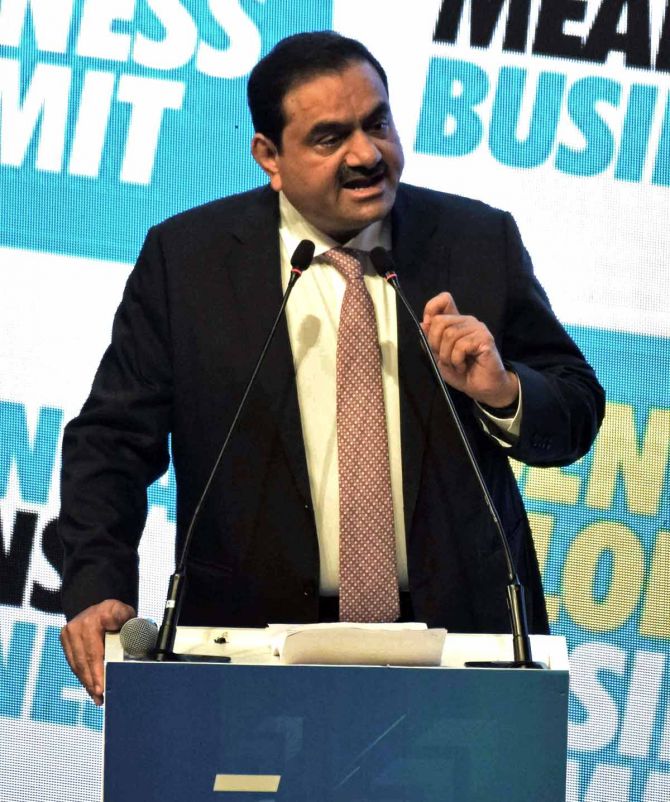'In equities, it has diversified portfolios.'
'So the short-term movement of individual stocks does not impact them.'

LIC is a long-term investor and has diversified portfolios, Tuhin Kanta Pandey, secretary, Department of Investment and Public Asset Management (Dipam), tells Shrimi Choudhary/Business Standard.
Do you think LIC shareholders need to be concerned about its exposure to Adani group companies? Is the development posing a systemic risk?
I can't comment on 'systemic risk' as these issues have been looked at by the regulators.
They (LIC and the banks) have a limit on large exposures.
Both banks and the LIC have clarified that they don't have a large exposure to the Adani group.
LIC keeps investing in companies as prescribed under IRDAI rules.
A very large proportion of the LIC investment has to be in government bonds and only a smaller portion can go into equities.
In equities also, it has diversified portfolios.
So the short-term movement of individual stocks does not impact them.
Overall, LIC and regulators must be watching the change in the value of its (the former's) investments.
The divestment target for FY24 is pegged at Rs 51,000 crore (Rs 510 billion). Is it a realistic target and how are you planning to achieve it?
It is a pragmatic target but achieving this is a challenge because of uncertainties in the market.
We had a target of Rs 1.05 trillion, inclusive of divestment worth Rs 65,000 crore and dividends of Rs 40,000 crore (Rs 400 billion).
Our RE (revised estimate) is now Rs 93,000 crore (Rs 930 billion) and comprises Rs 50,000 crore (Rs 500 billion) from divestment and Rs 43,000 crore (Rs 430 billion) from dividends.
So far, we have raised a total of Rs 68,000 crore (Rs 680 billion).
The BE (budget estimate) for FY24 is pegged at Rs 94,000 crore (Rs 940 billion). This includes Rs 51,000 crore (Rs 510 billion) from divestment proceeds and Rs 43,000 cr orefrom dividends.
We have minority stake sales in the pipeline through initial public offerings, offer for sale and buyback, and also through strategic divestment.
Bandwidths are different for different companies. In the case of buybacks and OFS, we have limited scope for minority stake sales (with the government holding capped at 51 per cent). For IPO, we are creating a new bandwidth.
Other than minority stake sales, our focus is on completing the ongoing privatisation transactions which are in the pipeline, including IDBI Bank, Shipping Corporation, and BEML.
Does a slow process limit non-debt capital receipts?
Privatisation processes are BMMP (bandwidth, market available, minority shareholders, and the process).
A process particularly is time intensive and takes time and it is rare that we get everything in time.
We have streamlined the internal process through education and awareness.
And all these we need to take into consideration.
The awareness has to come that disinvestment actually helps businesses to grow and even secure people's jobs and make the company viable.
Divestment is a collective effort. So from where the resistance is coming?
The contradiction in what we are trying to do in the case of privatisation is quite stark.
A lot of work has to be done by the company itself.
There is a lot of resistance, unwillingness, and apprehension over the process.
Friction is there as companies want to stay in the government.
A lot of cooperation is required from companies themselves.
So there are both external and internal factors.
Sometimes even matters in court pose challenges from employee unions.
These things also influence the management of companies.
The RBI in a recent circular said a person looking to acquire more than 5% stake in a bank needs to take prior approval. Will this impact the IDBI bank sale?
These are listed companies. So in the case of a bank, if you hold more than a certain percentage, it will require prior approval from the Reserve Bank of India.
The RBI policy says that banks have to be widely held.
And that is why, under the Banking Regulation Act, there is a voting share cap of 26 per cent, even if you are holding 50 per cent.
In banking companies, it is very important to monitor the shareholding and also key shareholders.
So, IDBI being a specific case where the RBI, it says, is involved in the entire process and will do the fit and proper, and it has to ultimately require approval.












 © 2025
© 2025